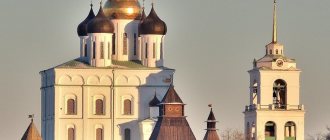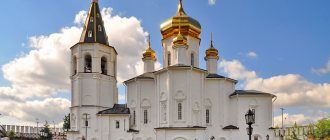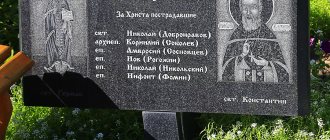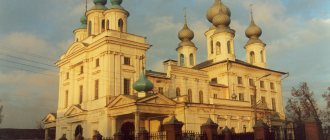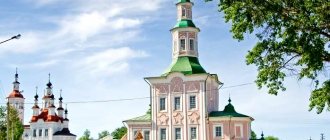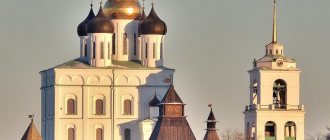There are articles on Wikipedia about other people with the name Pankraty and the surname Zherdev.
| Bishop Pankratiy | ||||||||||||||||||||||||||||||
| Bishop Pankratiy | ||||||||||||||||||||||||||||||
| since June 2, 2005 | ||||||||||||||||||||||||||||||
| ||||||||||||||||||||||||||||||
Biography
In 1970-1980, he studied first at the architectural department of the Perm Construction College, then at the architectural department of the Tajik Polytechnic Institute (Dushanbe).
After graduating from the institute, he worked as an artist in a publishing house, then began to live and work at St. Nicholas Cathedral in Dushanbe.
In 1986 he entered the Moscow Theological Seminary, and in the fall of the same year he entered the brethren of the Holy Trinity Lavra of St. Sergius. In those years, according to Pankratiy, only 4 monasteries operated in the USSR - the Pochaev Lavra, the Pskov-Pechersky Monastery and the Holy Dormition Monastery in Odessa[2].
He was tonsured a monk on July 3, 1987 with the name Pankratiy
, in honor of the Monk Pankratius, the recluse of Kiev-Pechersk.
On July 18, 1987, he was ordained as hierodeacon. June 8, 1988 - became a hieromonk.
He carried out obediences related to the holding of the Anniversary Local Council of the Russian Orthodox Church in the Trinity-Sergius Lavra, dedicated to the 1000th anniversary of the Baptism of Rus', then he carried out the obediences of an assistant economist, and then an economist of the Trinity-Sergius Lavra, and supervised the resumption of the Lavra's publishing activities.
On July 17, 1988, he was elevated to the rank of abbot. May 4, 1990 - to the rank of archimandrite.
In 1992, for the first time with a group of pilgrims, I visited Holy Mount Athos and brought back the Holy Fire from there. Upon returning from Athos, he was invited to the Patriarch of Moscow and All Rus' Alexy II, then he personally met the primate and told him about the trip. Soon after this, he submitted a request to be transferred to the Panteleimon Monastery on Athos. At the end of 1992, he was invited a second time to the primate, where he unexpectedly learned about a new assignment - to northern Athos. By his own admission, he accepted the will of the Hierarchy with obedience and humility[2].
At the Epiphany of the Lord in 1993, a patriarchal decree was signed on the appointment of Pankratius to Valaam[2].
On January 18, 1993, he was appointed abbot of the Spaso-Preobrazhensky Valaam Monastery[2].
With the blessing of the confessor of the Trinity-Sergius Lavra, Elder Kirill, Archimandrite Pankratiy invited a young, highly gifted novice from Macedonia, the future abbot Methodius[3], who became the abbot’s right hand in the monastery, his main assistant in the work of reviving the monastery[4][ 5].
Signed the “Statement of the Brotherhood of the Valaam Monastery” dated March 26, 1998, containing sharp criticism of ecumenism[6].
Since May 2002, Archimandrite Pankraty has been Chairman of the Board of the Patriarchal Board of Trustees for the revival of the Transfiguration Valaam Monastery.[7]
On April 20, 2005, by resolution of the Holy Synod, he was elected vicar of the Moscow diocese with the title “Trinity”[8].
On June 1, 2005, in the cross church in honor of All Saints, in the land of the Russian ones who shone forth, the Synodal and Patriarchal residence in the St. Daniel Monastery, Archimandrite Pankratius (Zherdev) was named Bishop of the Trinity[8].
On June 2, 2005, in the Epiphany Cathedral in Moscow, the consecration of Archimandrite Pankratius as Bishop of Trinity, vicar of the Moscow diocese took place[9].
By the decision of the Holy Synod of March 22, 2011, he was appointed chairman of the Synodal Commission for the Canonization of Saints.[10]
Pankratiy considers the late Patriarch of Moscow and All Rus' Alexy II to be the spiritual father of the Valaam Monastery, and the current state of the monastery, his beloved monastery, is the best monument to Alexy II[2].
“I was sure that the monks were harsh, angry and rude”
- In difficulties... For example, Abbot Spiridon (Balandin) wrote two years ago that “ today it is the sorrows from the monastic authorities, and not the sorrows from bearing monastic vows and ascetic deeds, that become the main cross for the brethren . You talk about sorrows, and he clarifies where they actually come from.
- Dear Father, let us open the ABC of monastic life, Abba Dorotheus, and begin to read. What will we find in this book? Let us read that the brothers, who did not love him, put harmful insects, fleas, lice on his rug in front of his cell, and urinated on his bed. How he crucified himself on obedience in the hotel, serving strangers to the point of exhaustion. We will read that bodily labors, with the right attitude, lead a monk to the most important spiritual virtue - humility.
Let's take another patericon. Let us read that there is an elder, not in the sense as we now perceive him, but an elder, as a commander, mocked his disciple Akakios, who performed unconditional obedience to him, and brought him to death.
- Is this normal?
— Of course it's not normal. However, when he buried him, another elder revealed to him that his novice had not died, and when he asked him at the grave, Akaki answered him that workers of obedience do not die. This elder repented and spent the rest of his days living a good life at the grave of the novice.
It’s also quite strange to think that only now, in the 21st century, we are experiencing grief from those in power. What, they weren’t there in the 19th century? Excuse me, but who were the leaders in the 20th century?
— So, our situation is better now?
— Who was in charge in the 20th century? I was in one monastery, again, I won’t name it, although this governor had already died, who could have hit him in the face...
-Who were you there?
- Just a pilgrim. This monastery is now widely known thanks to a popular book. For some reason, the governor turned against me and almost chased after me, swearing. Of course, I was in complete shock and horror. He called some old servant and said: “You see this guy, take him outside the gate so that he doesn’t set foot here again,” and the winter was fierce, I didn’t even have a place to spend the night. This old man took me so tenderly by the hand and said: “Darling, why are you talking to him? Is it possible to talk to him? As soon as you saw him, you were right there.” This is my experience of communicating with the abbot of the Soviet era.
This governor saw me as a Moscow spy. I was studying then, I was a student at the seminary, he decided that I had been sent there from Moscow for the holidays to spy. In the Soviet years, when I visited monasteries, I was sure that the monks were all harsh, angry and rude. I thought that was their job or something. There were all sorts of things... Both elders and tyrants.
And in the 19th century, if we start looking in the archives... Yes, even the published letters of St. Ignatius (Brianchaninov) about contemporary monasticism and Christianity. To think that monasteries have always been ideal is, of course not. And in the old days they were different, so to speak. If we take the Middle Ages, then all the brothers there were angels, all the abbots were so beautiful-hearted and loving? I always had to endure.
- Why be equal to the worst?
— I'm not saying that we should be equal to the worst. You just shouldn’t expect that in a monastery a person will have only joy and bliss, you need to be prepared for trials and difficulties. To the fact that you are embarking on a narrow and thorny path, the path following Christ, but this path leads to Golgotha, to the Cross. But the world cannot accept the word about the Cross; and monasticism itself, which is based on the Cross, is also, in fact, not understandable to the world and, in an everyday sense, not even normal.
In fact, it is normal for a secular person to have a family, property, and live as he wants. But the monk renounces all this. For many holy ascetics, the renunciation of the world and its benefits was absolute and abnormal from the point of view of the average person. Of course, this does not mean, according to the word of St. Paisius the Holy Mountain, that the abbot should turn into Diocletian, the tormentor of Christians. The same Abba Dorotheus has an excellent teaching for mentors, and many other fathers have said a lot about what an abbot should be like. I think leaders need to read this more often and remember it in their ministry. Bemoan your own shortcomings more than lament others.
— By the way, you wanted to go to Mount Athos forever when you were young?
— Yes, it happened.
- And why? Just after you were kicked out? Did you think it was better there?
— No, it was completely different. I had a personal spiritual experience on Mount Athos, a certain internal experience that was dear to me and is still very dear to me. That’s why, in fact, I wanted to stay there. I also tried to live in the desert at one time. This is a completely different story. Not at all because we had bad order in our monasteries.
In fact, even during the Soviet years people were saved. Then there were those in charge who had a very difficult time: resolving complex issues with “externals,” for example, and being on guard for the interests of the monastery. And the division between the brethren and the rulers is a legacy of the Soviet era, it comes from there. When administrators who received the approval of “externals” were appointed from above. The brethren could have been lucky; the abbot-administrator could have treated the monks well and created conditions so that they could live a spiritual life. But this might not have happened. Although this division is not even from Soviet times, it is from an earlier period, because in Imperial Russia, abbots of monasteries were already appointed from above.
Awards
Secular
- Order of Friendship (May 26, 2010) - for great contribution to socio-economic, scientific and cultural development and long-term social activities
[11] - Certificate of Honor from the President of the Russian Federation (August 14, 2013) - for achieved labor successes, active social activities and many years of conscientious work
[12] - Honorary Citizen of the Republic of Karelia (2008) - for special services in the restoration of a cultural historical shrine - the Spaso-Preobrazhensky Valaam Stavropegic Monastery, great personal contribution to the Orthodox and spiritual-moral education of the population and active participation in the implementation of socially significant programs for the republic
[13]
Church
- Order of the Holy Blessed Prince Daniel of Moscow, II degree (2007) - in consideration of archpastoral works
- Order of St. Sergius of Radonezh, II degree (2004) - in recognition of hard work and in connection with the 15th anniversary of the resumption of monastic life in the monastery
- Order of St. Seraphim of Sarov, II degree (2007) - in recognition of diligent service and in connection with the 20th anniversary of service in the priesthood
[14] - Order of St. Seraphim of Sarov, II degree (2013) - in recognition of many years of work on the restoration of the Spaso-Preobrazhensky Valaam stauropegic monastery
[15]
“Sooner or later, abbots will be chosen”
—Are you for elections or for appointment?
- If the monastery is mature enough and experienced brethren live in it, then, of course, I think it would be better if they chose from among their own. Historically, a monastery has always been created around some kind of spiritual leader, an elder, a saint. This is still relevant today. The abbot must have authority, respect from the brethren, and ideally, love .
So far, of course, we are mostly making appointments. It’s good if now the choice of the diocesan bishop and the hierarchy coincides with the opinion of the brethren. But I think, sooner or later, they will still choose. In a mature monastery, where there are quite a lot of serious and responsible brothers, they can elect a person who is authoritative for themselves or submit for approval to the bishop the two or three best, in the opinion of the brethren. This would be the most correct.
But this can only be done in a mature monastery, not in all. Somewhere there are people who are completely inexperienced and who have only recently gathered... In general, for a well-maintained and strong monastery - why not? However, here, too, there is a danger of choosing as abbot a weak person - an indulger or, conversely, a zealot beyond reason.
— Is your monastery strong?
— I think that our brethren could choose their own abbot.
- And if not you?
— For God's sake! I never aspired to be in charge. Well, so what, it means he didn’t deserve it. Although, to tell the truth, we have unity with the brethren, and there is peace in the monastery, and we try to respect and love each other. Of course, there are also disadvantages, not without this.
Returning to the question of choice, much depends on the bishop. He watches his diocese and sees where the monasteries are good, why should he invite someone from outside if there are worthy candidates. He can suggest it himself. I think so. Then in this case, of course, whoever was chosen was already chosen.
Even on Athos, it is not necessary that you have chosen a person who will please you in everything, and now you will only be happy all your life. I know one Athonite monastery, for example, where the abbot was a simple man. A very good prayer book, but simple. Even, in my opinion, illiterate. Different times have come, everyone has higher education, some programs of the European Union have been adopted. Large-scale restoration, multimillion-dollar investments, reports. Very serious, intelligent decisions need to be made. The brothers decided that the abbot was already old and could not even read some text on his own, so they decided: it was time to choose another, literate one.
Chose. That old man was retired, I met him. A bright man... I also met the new one, so I’ll say that I wouldn’t want to meet him a second time. And many brothers now regret that they chose this competent, good organizer on their own. Some even wanted to leave. that are such a panacea , no, you are mistaken. It’s good if he manages and improves, but if not, then this is for the rest of their monastic life.
— Many now believe that competent organizers at the head of monasteries is both good and bad at the same time. There is no prayerful attitude, only administrative and economic. Do you agree with this?
— How can I tell about everyone, I just don’t know them. I know several personally. We now had six hundred people gathered, I don’t even know them all. We now have so many abbots, so many bishops. I don’t even know all the bishops, I’m not familiar with everyone. How can I know who is spiritual and who is not? Who prays, who doesn’t pray... There are all kinds, probably a big family...
— Maybe we can somehow separate these two directions then?
— Why, what should we separate?
- Well, I do not know. Let’s say let a manager, a top manager, deal with the economy, and prayer...
— Do you know what I will say? Leave the monks to their own devices! There is no need for lay people to meddle in the life of the monastery and try to fix something there, no need! Monks and monasteries should have a certain freedom. There is a life of its own, some may not like it, it may even seem abnormal. Our rules are not even medieval, but even more ancient!
Dear laymen, there is no need to interfere in monastic life, this is none of your business, we ourselves will somehow figure it out without your advice and complaints! Leave God's things to God. If 90% of the monks like this monastic life, and they are saved in such conditions, let them be saved if it benefits their soul!
Notes
- [www.patriarchia.ru/db/text/1909320.html “Regulations on diocesan vicariates of the Russian Orthodox Church”]. // Patriarchia.Ru
- ↑ 12345
[www.patriarchia.ru/db/text/1595610.html Consolation of a monk. Conversation with the abbot of the Valaam Monastery, Bishop Pankratius of Trinity / Interview / Patriarchy.ru] - [www.stopstamp.ru/statty/htpt95at62pxmkbnmrg5.html IGUMENE MEFODIUS: HOLY BALAAM AGAINST LUXURY, VANITY AND PRIDE]. Retrieved January 23, 2013. [www.webcitation.org/6E7DuTcLM Archived from the original on February 2, 2013].
- [www.rg.ru/2012/08/10/valaam.html Elena Yakovleva: We should be ashamed of our illiterate view of church life - Elena Yakovleva - “On Valaam” - Rossiyskaya Gazeta - Elena Yakovleva: We should be ashamed of our illiteracy...]
- [svet-valaama.ru/dlya_nas_valaam_yavlyaetsya_vozmozh For us, Valaam is an opportunity to bring our love and service to the Lord (interview)]
- [www.ortho-hetero.ru/doc-aecum/83 Statement by the brethren of the Valaam Monastery, 1998]
- [www.eparhia.ru/pnews/?ID=124 Under the chairmanship of His Holiness Patriarch Alexy, a regular meeting of the Patriarchal Board of Trustees for the revival of the Spaso-Preobrazhensky Valaam Monastery took place.]
- ↑ 12
[www.pravoslavie.ru/13670.html Patriarch Alexy performed the rite of naming Archimandrite Pankratius (Zherdev) Bishop of Trinity / Pravoslavie.Ru] - [www.sedmitza.ru/text/402369.html The Primate consecrated Archimandrite Pankratius as Bishop of Trinity (commentary in the light of faith) - Articles - Church Scientific Center "Orthodox Encyclopedia...]
- [www.patriarchia.ru/db/text/1434985.html Bishop of Trinity Pankratiy was appointed chairman of the Synodal Commission for the Canonization of Saints]
- [lib.consultant.ru/doc.asp?ID=121849 Decree of the President of the Russian Federation of May 26, 2010 No. 648 “On awarding state awards of the Russian Federation to employees of enterprises, organizations and institutions of the Republic of Karelia”]
- [graph.document.kremlin.ru/page.aspx?3583331 Order of the President of the Russian Federation dated August 14, 2013 No. 302-rp “On promotion”]
- [valaam.ru/ru/news/2827/ Abbot of the Spaso-Preobrazhensky Valaam Monastery, Bishop Pankratiy, became an Honorary Citizen of Karelia]
- [www.patriarchia.ru/db/text/260310.html Patriarchal congratulations to Bishop Pankratius of Trinity on his 20th anniversary of service in the priesthood]
- [www.patriarchia.ru/db/text/3093455.html On the day of remembrance of Saints Sergius and Herman of Valaam, the Primate of the Russian Church celebrated the Liturgy in the Transfiguration Cathedral of the Valaam Monastery and led the consecration of Archimandrite Ignatius (Tarasov) as Bishop of Kostomuksha and Kem]
“If they complain to me, I take action”
“If it doesn’t benefit anyone, let them leave.” You don't have to be so naive. A person must have a head for some reason, let him think. If he doesn’t like it, if everything is bad, then “bye, I saw him and bye!” That's all.
- Well, everyone was “obliged” then, right? What about the hierarchy?
— Then he will begin to take action.
- And everyone has already been “killed”!
— So they will take measures then; under the current order, control is serious. What do you propose now? Should we do some kind of all-Russian check? Do your sisters stand in the cold or not?
- Why such extremes?
— How else?
- Well, if a Christian hears that his brothers and sisters are in distress, isn’t there a natural desire to help them, to figure it out? If it exists, then the solution to the problem will come later. If only it was there, this message.
— If, indeed, some kind of disgrace happens in some monastery, then it will never be covered up. It will always come out somewhere. Naturally, measures will be taken. That's all. One of these signs is the so-called “turnover”. There is such a phenomenon in monasteries, and that’s what it’s called. Just as there was a “turnover” at work earlier in Soviet times, so it is now in monasteries. They're running! If it's bad, they run. In the end they complain. Therefore, I would not exaggerate things like that.
- They complain, and you say: “Be patient!”
- Why? I don’t tell them to tolerate obvious lawlessness. To endure sorrow is one thing, but if there is disgrace, lawlessness, the commandments of the Gospel and the rules of the church and generally accepted ones are violated, measures must be taken. If they complain to me, I take action. Only first do I find out what the matter is, and only then do I make a decision. I think they do the same in other places.
- Can any monk complain to you?
- From my monastery only. Imagine, some abbot or abbess from another monastery will say to me: “You know, a certain brother of yours is complaining that something is wrong with you” - what is this? It’s not a matter of intruding into someone else’s abode if they don’t ask.
We had such a case: one such verb “elder” came, I will not mention his name. So he says to one novice: “You will die here, you need to go to the abbot, you need to transfer to another place,” and everything like that. Next time I won't let him in the door. He came from afar and knows better what’s going on here? I live here! These are my children, my brothers. It's just some kind of absurdity.
And he said to another: “Go to the abbot, tell him to tonsure you and ordain you to the priesthood.” The novice came and said, I answered him: “You know what? Where are you? In the stables, on the farm? Here, go ahead, move on, clean the dung, herd the cows, it’s more useful for you than begging for holy orders.” That's all, you understand? This is my business, my responsibility. I know better where my brother should be and what he should do. And if a brother from another monastery complains to me about his abbot, I won’t even listen to him. There are plenty of grumblers and self-willed people.
— What if there is no response to the complaint? The “Confession” describes a case where one nun complained, wrote, and everything came back to the abbess. There, among other things, this sister (she, by the way, left the monastery) said that there was not enough toilet paper and requests to mother had no effect. It's just something...
- We have a monastery. And, thank God, in more than twenty years I don’t remember that there were any complaints, that the Patriarch or anyone else complained that something was missing. Although sometimes the most necessary things were not enough. In 1998, during the default, they even thought of resettling the brethren in the Compounds. There was no money, no food, no fuel on the island. But with God's help we overcame everything - no one complained.
Well, the Christian principle is “don’t do to others what you don’t wish for yourself.” You don’t want to sit without toilet paper, let your sisters have it too. To do this, there must be someone who must monitor this. All this is written down, these are basic things. To be honest, I’m even a little embarrassed to discuss this. It’s even somehow strange. Hard to believe.
- We don’t know, yes, how true this is.
— We don't know either. The signal is so serious, let them find out and check, if they want to reassure the public, it’s not difficult. It will quickly become clear whether this is true or slander. While we are discussing the stories of a disappointed person, this does not mean that all this is 100% true. I’m somehow not inclined to completely believe the author. If there weren’t so many sisters there, several abbess of other monasteries wouldn’t have come out if people were being tortured there.
You will know them by their fruits... I had never heard anything bad about this monastery before this publication commotion. I don’t want to blame the author; probably, two views on the monastery collide here: secular and monastic.
I hope that this woman, apparently, did not write in order to take revenge somehow, to offend, or to cause harm. I think she had some good intentions: to warn the girls not to be naive and check where they were going. There are many monasteries now — hundreds. Life is not enough to try everything. Live in one, live in another...
Another thing is that it may turn out that I came to one monastery, there was one abbot, one environment. Then suddenly something changed. The abbot passed away, or was transferred somewhere. An unknown person fell from somewhere, and everything became different. This, of course, can be a difficult situation. A man has lived for decades in a monastery, and before his eyes the monastery becomes something else.
Difficult. For those just starting out, it's easy for them. The only thing is that you should not be deceived by the first slight superficial impression. Because to a person coming, say, from the world, it may seem that this is almost paradise. Everything may look good, wonderful, but it may not be true at all.
Excerpt characterizing Pankratiy (Zherdev)
- Why is it late? “It’s late, it’s 10 o’clock,” Natasha’s voice answered, and in the next room the rustling of starched dresses, the whispering and laughter of girls’ voices was heard, and something blue, ribbons, black hair and cheerful faces flashed through the slightly open door. It was Natasha with Sonya and Petya, who came to see if he was up. - Nikolenka, get up! – Natasha’s voice was heard again at the door. - Now! At this time, Petya, in the first room, saw and grabbed the sabers, and experiencing the delight that boys experience at the sight of a warlike older brother, and forgetting that it was indecent for sisters to see undressed men, opened the door. - Is this your saber? - he shouted. The girls jumped back. Denisov, with frightened eyes, hid his furry legs in a blanket, looking back at his comrade for help. The door let Petya through and closed again. Laughter was heard from behind the door. “Nikolenka, come out in your dressing gown,” said Natasha’s voice. - Is this your saber? - Petya asked, - or is it yours? - He addressed the mustachioed, black Denisov with obsequious respect. Rostov hastily put on his shoes, put on his robe and went out. Natasha put on one boot with a spur and climbed into the other. Sonya was spinning and was just about to puff up her dress and sit down when he came out. Both were wearing the same brand new blue dresses - fresh, rosy, cheerful. Sonya ran away, and Natasha, taking her brother by the arm, led him to the sofa, and they began to talk. They did not have time to ask each other and answer questions about thousands of little things that could interest only them alone. Natasha laughed at every word that he said and that she said, not because what they said was funny, but because she was having fun and was unable to contain her joy, which was expressed by laughter. - Oh, how good, great! – she condemned everything. Rostov felt how, under the influence of the hot rays of love, for the first time in a year and a half, that childish smile blossomed in his soul and on his face, which he had never smiled with since he left home. “No, listen,” she said, “are you completely a man now?” I'm terribly glad that you are my brother. “She touched his mustache. - I want to know what kind of men you are? Are they like us? No? - Why did Sonya run away? - Rostov asked. - Yes. That's another whole story! How will you talk to Sonya? You or you? “As it will happen,” said Rostov. – Tell her, please, I’ll tell you later. - So what? - Well, I’ll tell you now. You know that Sonya is my friend, such a friend that I would burn my hand for her. Look at this. - She rolled up her muslin sleeve and showed a red mark on her long, thin and delicate arm under the shoulder, much above the elbow (in that place that is sometimes covered by ball gowns). “I burned this to prove my love to her.” I just lit the ruler on fire and pressed it down. Sitting in his former classroom, on the sofa with cushions on his arms, and looking into those desperately animated eyes of Natasha, Rostov again entered that family, children's world, which had no meaning for anyone except for him, but which gave him some of the best pleasures in life; and burning his hand with a ruler to show love did not seem useless to him: he understood and was not surprised by it. - So what? only? - he asked. - Well, so friendly, so friendly! Is this nonsense - with a ruler; but we are forever friends. She will love anyone, forever; but I don’t understand this, I’ll forget now. - Well, what then? - Yes, that’s how she loves me and you. - Natasha suddenly blushed, - well, you remember, before leaving... So she says that you forget all this... She said: I will always love him, and let him be free. It’s true that this is excellent, noble! - Yes Yes? very noble? Yes? - Natasha asked so seriously and excitedly that it was clear that what she was saying now, she had previously said with tears. Rostov thought about it. “I don’t take back my word on anything,” he said. - And then, Sonya is such a charm that what kind of fool would refuse his happiness? “No, no,” Natasha screamed. “We’ve already talked about this with her.” We knew you would say this. But this is impossible, because, you know, if you say that - you consider yourself bound by the word, then it turns out that she seemed to say it on purpose. It turns out that you are still forcibly marrying her, and it turns out completely different. Rostov saw that all this was well thought out by them. Sonya amazed him with her beauty yesterday too. Today, having caught a glimpse of her, she seemed even better to him. She was a lovely 16-year-old girl, obviously loving him passionately (he did not doubt this for a minute). Why shouldn’t he love her now, and not even marry her, thought Rostov, but now there are so many other joys and activities! “Yes, they came up with this perfectly,” he thought, “we must remain free.” “Well, great,” he said, “we’ll talk later.” Oh, how glad I am for you! - he added. - Well, why didn’t you cheat on Boris? - asked the brother. - This is nonsense! – Natasha shouted laughing. “I don’t think about him or anyone else and I don’t want to know.” - That's how it is! So what are you doing? - I? – Natasha asked again, and a happy smile lit up her face. – Have you seen Duport? - No. – Have you seen the famous Duport the dancer? Well, you won't understand. That's what I am. “Natasha took her skirt, rounding her arms, as they dance, ran a few steps, turned over, did an entreche, kicked her leg against the leg and, standing on the very tips of her socks, walked a few steps. - Am I standing? after all, she said; but couldn’t help herself on her tiptoes. - So that’s what I am! I will never marry anyone, but will become a dancer. But do not tell anyone. Rostov laughed so loudly and cheerfully that Denisov from his room became envious, and Natasha could not resist laughing with him. - No, it’s good, isn’t it? – she kept saying. - Okay, don’t you want to marry Boris anymore? Natasha flushed. - I don’t want to marry anyone. I'll tell him the same thing when I see him. - That's how it is! - said Rostov. “Well, yes, it’s all nothing,” Natasha continued to chatter. - Why is Denisov good? – she asked. - Good. - Well, goodbye, get dressed. Is he scary, Denisov? - Why is it scary? – asked Nicholas. - No. Vaska is nice. - You call him Vaska - strange. And that he is very good? - Very good. - Well, come quickly and drink tea. Together. And Natasha stood on tiptoe and walked out of the room the way dancers do, but smiling the way only happy 15-year-old girls smile. Having met Sonya in the living room, Rostov blushed. He didn't know how to deal with her. Yesterday they kissed in the first minute of the joy of their date, but today they felt that it was impossible to do this; he felt that everyone, his mother and sisters, looked at him questioningly and expected from him how he would behave with her. He kissed her hand and called her you - Sonya. But their eyes, having met, said “you” to each other and kissed tenderly. With her gaze she asked him for forgiveness for the fact that at Natasha’s embassy she dared to remind him of his promise and thanked him for his love. With his gaze he thanked her for the offer of freedom and said that one way or another, he would never stop loving her, because it was impossible not to love her. “How strange it is,” said Vera, choosing a general moment of silence, “that Sonya and Nikolenka now met like strangers.” – Vera’s remark was fair, like all her comments; but like most of her remarks, everyone felt awkward, and not only Sonya, Nikolai and Natasha, but also the old countess, who was afraid of this son’s love for Sonya, which could deprive him of a brilliant party, also blushed like a girl. Denisov, to Rostov’s surprise, in a new uniform, pomaded and perfumed, appeared in the living room as dandy as he was in battle, and as amiable with ladies and gentlemen as Rostov had never expected to see him. Returning to Moscow from the army, Nikolai Rostov was accepted by his family as the best son, hero and beloved Nikolushka; relatives - as a sweet, pleasant and respectful young man; acquaintances - like a handsome hussar lieutenant, a deft dancer and one of the best grooms in Moscow. The Rostovs knew all of Moscow; this year the old count had enough money, because all his estates had been remortgaged, and therefore Nikolushka, having got his own trotter and the most fashionable leggings, special ones that no one else in Moscow had, and boots, the most fashionable, with the most pointed socks and little silver spurs, had a lot of fun. Rostov, returning home, experienced a pleasant feeling after some period of time trying on himself to the old living conditions. It seemed to him that he had matured and grown very much. Despair for failing to pass an exam according to the law of God, borrowing money from Gavrila for a cab driver, secret kisses with Sonya, he remembered all this as childishness, from which he was now immeasurably far away. Now he is a hussar lieutenant in a silver mentic, with a soldier's George, preparing his trotter to run, together with famous hunters, elderly, respectable. He knows a lady on the boulevard whom he goes to see in the evening. He conducted a mazurka at the Arkharovs’ ball, talked about the war with Field Marshal Kamensky, visited an English club, and was on friendly terms with a forty-year-old colonel whom Denisov introduced him to. His passion for the sovereign weakened somewhat in Moscow, since during this time he did not see him. But he often talked about the sovereign, about his love for him, making it felt that he was not telling everything yet, that there was something else in his feelings for the sovereign that could not be understood by everyone; and with all my heart he shared the general feeling of adoration in Moscow at that time for Emperor Alexander Pavlovich, who in Moscow at that time was given the name of an angel in the flesh.
“It is important not to lose interest in spiritual life”
—
Should monks work until they drop?
- Of course not.
—
What should an ideal day look like?
- Let's look at Athos, where spiritual life was not interrupted. Thousand-year-old traditions have always been preserved there. It is believed that the main work of a monk is prayer. We did not come to the monastery to set records for harvesting or making something. We came to transform the soul, to pray for the whole world, this is the main thing. Naturally, they should not be parasites, they should work.
This is also necessary for the person himself. He cannot pray all the time. If he does not work, it means he will be idle; if he is idle, this will lead to his degradation as a person. There is also a saying that prayer and work are like two oars. If you press both correctly at the same time, you will swim straight. If you focus on only one thing, you will spin in place. This is conditional, but there is some truth in it.
Therefore, a monk must have time, strength and desire to pray. On the other hand, there are people who are more prone to an active life; it is difficult for them to spend much time in prayer. They are more active, more active, they need to work more. This is how, of course, we find such obedience that he prays, of course, goes to church, but he spends more time and energy on obedience than other brothers. It also happens the other way around. We have a brother - no matter what you entrust to him, he cannot cope with anything. Let him pray, thank God. You already give him the kind of obedience that would allow him to pray more.
—And during the day—how many hours for prayer, work, and rest?
- 8 hours of work is even a lot, taking into account the service and the cell rule. On Athos they work, in my opinion, for 4 hours in most monasteries, because every single one of them spends several hours in the temple, plus cell prayer. On Valaam they usually work for about 6 hours. It depends on what kind of work it is. We have different ways. It happens that on one day they work for many hours, and on another day they rest - taking turns. Such obedience that it requires several hours in a row, you can’t do anything, you can’t change it, they themselves ask to work in shifts.
— If 6 hours of work, then how much is prayer and rest?
- In different ways too. It’s also impossible to say that everyone needs 6 hours of sleep, some people sleep 6 hours, but for others that’s not enough, let them sleep 8 hours, for God’s sake! It's all individual. Or how long he will pray. Someone can pray for half an hour, that’s good, but someone can pray for two hours. Everything is different, it depends on people. The main thing is not to be idle, not to sin, to correct your life, not to lose interest in spiritual life - this is the most important thing.
Photo: monk Anastasy / valaam.ru
“I don’t keep anyone in the monastery, a slave is not a pilgrim”
- But it happens that a person does not leave, but changes. It seems to be the same abbot, but not quite, it’s jammed, you look and don’t recognize it. What to do? Can a monk now leave for another monastery, and what are the rules for transferring?
- It is not customary to cross. We must carry it. Including from the bosses. These changes usually do not affect the innermost life. Now, if they are already beginning to regulate it, say, to take communion rarely or to force it often, something else like that regarding confession, revelation of thoughts - this is a very difficult question. Issues of spiritual care and guidance are not easy to resolve. Experience and knowledge of monastic traditions are important here, and most importantly , a kind, loving heart.
And we must understand that our monasticism is still very young. All our monasteries, well, how old are they? Twenty years, and with constant turnover. Most people still have little experience, many are beginners. I view myself, the people of my generation, in such a way that we are only preparing the ground for those who will come after us. I see very kind and good monks in my monastery. After us, spiritual life can become better.
- Well, still, can a monk move to another monastery and under what conditions?
— A tonsured monk promises in his tonsure that he will remain in this monastery.
To be tonsured means that you must live in this monastery all your life until death. Therefore, it must be treated responsibly. We have one novice who carries out a complex, responsible obedience, lives in the monastery for more than twenty years and... refuses to take monastic vows. I tried my best to persuade him! He is already fifty years old, and even in front of His Holiness he jokingly complained about him. However, the Patriarch approved his choice. Taking tonsure is a very serious matter. After years of experience, the novice must become convinced that he can and is ready to live here until death. Therefore, an unauthorized transition is impossible without a good reason.
- I see, well, we just touched on the topic that everything can change. And there are transitions, we know examples.
— Everything happens to change. People lived in one country until 1917, then everything changed, they began to live in another and could not do anything, even though they fought to the death on the Civil War. What are you going to do here? Only humble yourself if God humbles you. Sometimes monks transfer, yes, but with the consent of the abbot. We have adopted ancient patristic rules, canons, which were established long ago by the holy fathers and which we promise to observe when taking tonsure. The transition can only take place with the blessing of the abbot. If I don’t want to let someone go, then the other cannot allow it.
- That is, if you torture someone to death, then this martyr cannot move to another monastery without the blessing of his tormentor?
“ If a monk sees that this is disastrous for him, for his soul, for his being, then there will be no sin if he leaves this monastery. Even if his monastic robes are removed, he has a good reason. The ancient charters and rules say that if the abbot is a heretic, or the basic monastic principles are violated, then he can leave this place.
Then, we see even from the lives of saints. Let’s say a saint lived in a monastery, then, due to the crowds and fame, he left it and went into the desert. The church does not condemn him for this; on the contrary, he praises him.
- This is different. Either you stay with your tormentor, or you take off your monastic robes and go where?
— You don’t even have to take them off, they will take them off of you nominally, but if you are honest with yourself, with your soul, please go and work in another place.
-Who will take it without the blessing of the tormentor?
— They won't take it without a blessing.
- Here you go…
— But there is a church court. If lawlessness has occurred, you can go there. And what is the purpose of many years of novice training? This is not a whim. Just ask, do women’s monasteries tonsure someone into a mantle before they are 10 years old in the monastery? They rarely get tonsured. And if everything around changes, then our new martyrs, let’s say, how? Everything has changed, the country has become different, they began to persecute for their faith, and now what, abandon the Church?
— Would you allow leaving the monastery and under what conditions?
— I can only talk about my monastery. I release novices, I don’t keep anyone. If a person comes to me and says that he doesn’t like it here, wants to leave... “A slave is not a pilgrim,” says popular wisdom. If you are a monk , it is already more difficult. I will try to somehow reason with my brother, explain, calm him down. If I see that he is making a mistake, I try to stop him. If I see that it is useless to talk to a person, nothing helps, he has already firmly decided to leave, then I let him go.
— If you had powers, would you allow people to move from monastery to monastery?
— You know, it's a double-edged sword, a double-edged sword. We must act very carefully. One of the main monastic virtues is patience. Without patience it is impossible to succeed. Transitioning is like replanting a tree. There will be something wrong everywhere. Somewhere the abbot is good, but the brothers are evil. Somewhere everything is fine, but the cell is wet. Somewhere, again, everything is fine, but there are a lot of people. There will be something wrong everywhere, there will be shortcomings everywhere. I know a monastery in Karelia, when there is a strong storm on the lake, the waves reach the windows, icy splashes fly into the windows of the brethren. It’s bad, it’s hard, but the brothers endure it.
- We're talking about something else!
— How about something else?
- We are not talking about the waves, but about the abbot.
— And these are the abbot's waves!
- Aaaaaah... abbots!
— What do you think, is it easy to endure such adversity for years? You go to Valaam or Solovki, spend the winter there somewhere on a distant island monastery, where there are no amenities, and there is three hours of daylight during the winter, but there is no electricity, and there is no transport. This is not the bosses waiting in the cold for an hour.
- So, you are comparing the weather and elements with the malicious will of man?
— I'm not comparing. I'm just saying that you have to be patient. If you have come, you see that it is stormy here, that the waves are flooding your cell, but you are ready to endure for the sake of the Lord, so be patient then, save yourself! Any monastery, any monastery, any monastic path is the path of the cross. We follow Christ, do you understand? This is always the path to Calvary. It doesn’t matter what kind of sorrow it will be, what kind. Will your brothers sprinkle harmful insects under your door, or will you be offended by your superiors, or will there be some kind of domestic shortcomings, or will illnesses torment you? There can be different sorrows. But the Lord does not leave if a person endures for His sake.
When you have endured everything, “Rejoice, ” says the Lord, “ your reward is many in heaven” - this is what is said in the rite of monastic tonsure. But not only in Heaven, here a true monk already knows the grace of God, the inexpressible joy of God’s closeness. Otherwise, the monks would not have begun to live in monasteries and endure many temptations and sorrows for the sake of Christ...
To be continued…
In the final part of the interview, Bishop Pankratiy will tell you whether he regrets that out of obedience he ended up on Northern Athos instead of Greek, whether monastics should open their thoughts to the abbot and how to do it, and where one paper went that a monk of the Valaam Monastery tried to hand over to the President of Russia.
